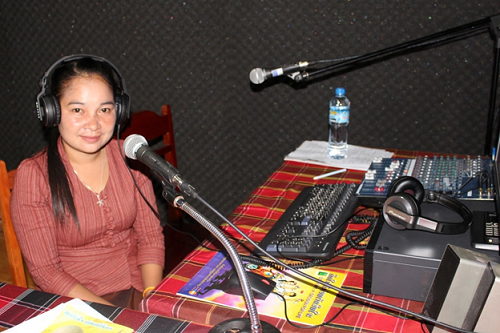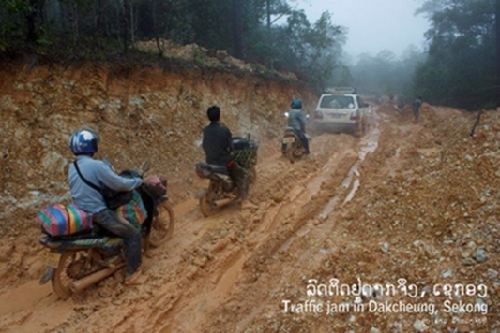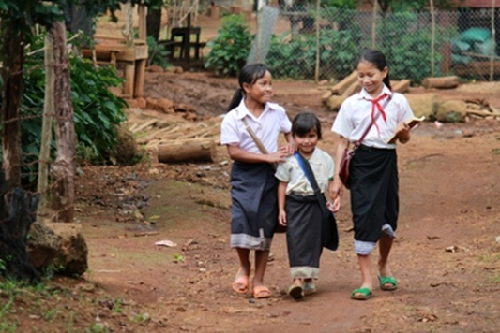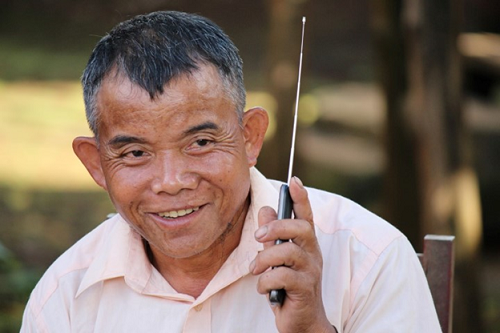Community Radio in Laos
Trustworthy technology offers new hope for Laos’ poorest communities
By Chelsey Parish, Communications Offcier, UNDP Lao PDR
VOLUNTEER VOICES
It has been a long day for Community Radio Volunteer Ms. Mouddala Keonheun. By the time she arrives at the Lakonepheng Community Radio Station, the sun is already starting to set on the small, square building, rising solidly out of a sparse cow and goat paddock in the south of Laos. Mouddala is a teacher at the local school. Every day after class she loads her treasure trove of text books onto an old motorbike and heads to the station to broadcast her basic education programme. Her programme reaches more than 45,000 people – most of them struggling to access even the most rudimentary education.
An educator and activist at heart, Mouddala volunteers at the radio station to influence her community’s attitude towards education. “I try to make people understand the importance of education and keeping their children in school. At the moment, a lot of our young people leave school early and go to Thailand to do physical labour,” says Mouddala.
In recent years, Mouddala has lost many bright, young students to the lure of unskilled labour cash jobs in Thailand’s rapidly developing cities. A problem mirrored across the country driven by lack of adequate schooling, access to information and local jobs, contributing heavily to intergenerational poverty in Laos.
 Community Radio Volunteer Mouddala broadcasts basic education programmes and is passionate about giving young people a chance to learn. Photo: UNDP Lao PDR
Community Radio Volunteer Mouddala broadcasts basic education programmes and is passionate about giving young people a chance to learn. Photo: UNDP Lao PDR
A CHALLENGING TERRAIN FOR COMMUNICATION
As a small, land-locked country in Southeast Asia, Laos (officially Lao People’s Democratic Republic) bears the thorny crown of a ‘Least Developed County’. This means the country is facing many uphill challenges to sustainable and equitable development. These challenges are compounded by 63 per cent of the country’s 6.4 million population living in incredibly remote, often mountainous and ethnically diverse communities, many of which are inaccessible for large parts of the year due to bad roads worsened by monsoon rains. Basic health and public services as well as infrastructure like paved roads and sanitation systems are yet to reach many communities.
The Community Participation and Communication Support Programme, implemented by the Lao Ministry of Information, Culture and Tourism and the United Nations Development Programme (UNDP) with support from Oxfam, has been working to tackle some of these challenges since 2006, specifically by bringing transformational information, including messages on education and public services, into the poorest and most disadvantaged homes through grassroots Community Radio Stations. The main focus of the programme is to give voice to Laos’ most marginalised groups, women and ethnic minorities by spreading community-driven media across the whole of the country. The UNDP believes that strong and effective media is at the heart of equitable development and is a right for all Lao people.
 Dirt roads in mountainous areas turn into a sea of mud in the rainy season, cutting villages off from the outside world and restricting access to public services and information. This picture show the main access road to a village in Dakcheung District, Laos. Photo: UNDP Lao PDR
Dirt roads in mountainous areas turn into a sea of mud in the rainy season, cutting villages off from the outside world and restricting access to public services and information. This picture show the main access road to a village in Dakcheung District, Laos. Photo: UNDP Lao PDR
DEVELOPMENT AT ALL LEVELS
In this media landscape, the community radio stations offer a unique channel for community-led media. Each community radio station is run by a small army of local who volunteers who create radio content based on local issues and news. The volunteers operate seven Community Radio Stations across four provinces and broadcast in eight ethnic languages. Local volunteers include men, women and youth who share a common goal of helping to improve their communities while learning new skills.
Mr. Thongmy Keothongdam, Vangkhaed Village Chief and volunteer broadcaster at Lakhonepheng Community Radio Station, is part of the local Khteng ethnic minority, one of the officially recognised 49 ethnic minorities of Laos. Thongmy broadcasts local news and public service announcements in his indigenous Khteng language, helping to bridge the gap between the Government, who operate in Lao language, and the needs of his community.
“My experience as a Community Radio volunteer has been very good as I have learned many news skills to help my people, as well as the wider community… We must all use this opportunity for sharing information to help each other develop our region and our nation together,” says Thongmy.
Community Radio volunteers also benefit from the programme by gaining new skills in broadcasting, programme production, garnering community support and equipment maintenance, enabling them to produce programmes tailored to the needs and interests of their communities. Many volunteers report personal positive impacts as they gain self-confidence and knowledge through their work.
“I have seen the changes our Community Radio programmes bring to the communities, and for women in particular. Working in Community Radio has given me the confidence to believe I can empower people to change their lives for the better,” says Ms. Khamla, a volunteer Community Radio Broadcaster from Sekong Province.
DEVELOPING COMMUNITIES THROUGH ACCESS TO INFORMATION
As well as effecting positive change at a personal level, Community Radio in Laos has helped to develop communities. According to the UNDP’s Review and Impact Assessment of Khoun Radio Support Project, the programme’s flagship station in the northern province of Xieng Khouang, the majority of the district’s population now see Community Radio as their primary source of information. Vaccination rates have risen by more than 50 per cent and the number of women using health facilities during their pregnancy has increased by nearly 70 per cent – all thanks to information delivered via Community Radio. The station’s volunteers were awarded a labour medal by Lao Prime Minister Thongsing Thammavong in 2012, who also acknowledged them for their contribution to natural disaster preparedness and recovery.
From these results it is clear that the Community Radio Stations are helping to shift the balance of rural development back to the communities themselves who are using the radio as an effective tool for education, heath, public services and advocacy in ways that intimately connect with the unique challenges of their own communities.
 Basic education and gender equality are a key focus of Laos’ volunteer-run Community Radio programme. Photo: UNDP Lao PDR
Basic education and gender equality are a key focus of Laos’ volunteer-run Community Radio programme. Photo: UNDP Lao PDR
SUSTAINABILITY
Like many grassroots, community-lead development projects around the world, sustainability is a key challenge. Many of Lao PDR’s Community Radio Stations face ongoing issues, including funding, volunteer turnover, station management, quality of broadcasts and district level support, despite the clear, positive impacts on rural development. Many of Laos’ Community Radio Stations are also isolated by a shortage of transport and telephones. Mobile phones are helping somewhat to ease isolation, but they are expensive and not serviceable in many areas. Access to the internet is still a dream for most in rural Laos.
The Government of Lao PDR’s support for the programme is strong, with the Ministry of Information, Culture and Tourism recognising that Community Radio has an important role to play to in the development of Laos. Speaking at the launch of Lakhonepheng Community Radio Station in October 2015, Deputy Minister of Information, Culture and Tourism, H.E. Mr. Savankhone Razmountry acknowledged Community Radio’s “significant contribution to the development in the country. […] It is important for the people to have a voice, so the community must build a foundation of good management and financial support to ensure the future of this Community Radio station. [… ] We must ensure the stations are sustained as a tool for information sharing for development and also for preserving the rich culture of the region.”
FUTURE PHILOSOPHY
For Lakhonepheng Community Radio Volunteer Mouddala, the daily, dusty pilgrimage to her local station is well worth the trip. Smiling shyly as she adjusts her microphone and headset in the sound-proof booth, Mouddala quietly explains her philosophy to tackling her community’s biggest challenge head-on: “Staying in school and learning is better for the children’s future. But so many can’t stay, that’s why Community Radio is so important, to teach those who want to learn and give people without an education a way to be heard.”
With community leaders like Mouddala producing strong and effective community radio, the unique voices of Laos’ marginalised and poorest communities are beginning to be heard.
- To watch the UNDP Lao PDR’s latest film on Community Radio in Lao Language, ‘From Ripples to Waves: Scaling Up Community Radio in Lao PDR’ click here.
- For more information about the UNDP in Lao PDR’s Community Radio Programme, here
- For recent news on Community Radio in Lao PDR, click here.
- To view UNDP’s photo story, click here.

